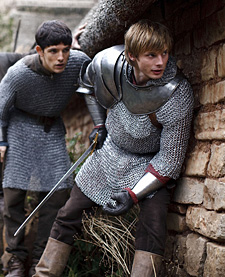Merlin is basically Harry Potter television. Aimed at the tweens and teens, it draws on a growing appetite for fantasy fiction to sustain an engaging series about the problems with being young.
The arrival of Hogwarts, Middle Earth and Narnia on the big screen has helped fuel a hunger for fantasy stories amongst kids and kidults that has spilled out of the cinemas and into the living room. Most of the television spin-offs like Jane and the Dragon, The Worst Witch and Elidor reside firmly in children's television time-slots. But there have also been recent forays into adult territory, including the BBC production Robin Hood. Merlin joins their ranks.
 The big-budget series follows the adventures of the young sorcerer before he becomes the famous bearded wizard from the Arthurian legend. Merlin is a servant in Uther Pendragon's Camelot, the castle home of a young Prince Arthur, Morgana and Guinevere. Merlin and Arthur grate on each other, but when the young wizard saves the prince's life the king rewards him by appointing the teenager as his son's valet. From that position Merlin finds himself having to defend Arthur week after week from a series of supernatural attacks. The serious hitch in Merlin's life is that though he is naturally gifted with magic, King Uther has banned magic of any kind on pain of death.
The big-budget series follows the adventures of the young sorcerer before he becomes the famous bearded wizard from the Arthurian legend. Merlin is a servant in Uther Pendragon's Camelot, the castle home of a young Prince Arthur, Morgana and Guinevere. Merlin and Arthur grate on each other, but when the young wizard saves the prince's life the king rewards him by appointing the teenager as his son's valet. From that position Merlin finds himself having to defend Arthur week after week from a series of supernatural attacks. The serious hitch in Merlin's life is that though he is naturally gifted with magic, King Uther has banned magic of any kind on pain of death.
Merlin's target audience is immediately apparent: all of the actors are twenty-somethings playing teens; the language is modern and colloquial (Merlin worries about getting 'sacked'); and the time-slot is 6.30 pm on a Sunday night. There are also several anachronisms like the liberties accorded women and the size of Merlin's bedroom that should increase the appeal to a younger mindset but would probably make an historian blanch. More importantly, the issues episodes deal with are aimed squarely at the teenage market.
Merlin rails to Gaius his guardian against the social structures that keep him from speaking his mind. His anger about being an invisible servant clearly aims to identify him with youth who feel their voices aren't being heard:
Merlin: "So my word doesn't count for anything?"
Gaius: "I'm afraid it doesn't count for much with the king. That's the way things are."
In an episode centring on a medieval tournament, a young Arthur struggles to live up to his father's expectations. During the same episode Gaius warns Merlin about the dangers of rushing to a solution without proper investigation, and touches a youthful aversion to inaction:
Gaius: "Patience is a virtue."
Merlin: "There's something good about sitting by and doing nothing??"
Some of the approaches the series adopts are helpful; others just pander to youthful solipsism. However there is at least one recurring theme that should be of interest to Christians.
Many believers will be concerned with Merlin solely for the positive spin it gives to magic. In Merlin's universe it is as neutral as a spade. As Gaius sums it up, "It is neither good nor bad, it's how you use it." Personally I don't believe that the series threatens to spawn countless witches and warlocks; experts suggest that children are more than capable of discerning fantasy from reality from the age of six. However I do think there is something to be gained from the ethic that suggests the intention of the heart is important.
As Christians we want to shift our children from the very natural desire to relate to God on the basis of a set of rules and on to the idea of loving him from the heart. Merlin contains several storylines that highlight how ostensibly good deeds can hide evil purposes, and how mistakes can emerge from people with positive intentions. When we watch these programs with them, we should be pointing out that God takes a similar approach in looking on the heart of every human being. He is far more interested in our motivations than our achievements, and the heart that has not been transformed by Christ is going to have little chance of pleasing him.
If there is a down-side to Merlin it is the way it handles the spiritual world. Accessing the powers of that other existence revolves around knowing the secret words and uses of arcane objects. It's a confusing, hidden world where even the gifted Merlin is often out of his depth. The same goes for young wizard's dealings with the series' resident 'god figure'. John Hurt supplies the voice of the oldest of dragons who is imprisoned in the caves beneath Camelot. He is the wisest and most powerful of all characters who is clearly aware of Merlin's destiny, often providing him with riddles regarding his future. But Merlin's struggles hardly seem to concern him at all:
Merlin: "Please! Help me!
Dragon: "I am." (laughs)
Merlin: "Yeah, right!"
It's a very modern idea of God. There's no objection to considering him wise, but is he accessible? Does he care or is he similarly laughing on the edge of the action? And when God speaks, can he be understood? In the end Merlin is forced to rely on his own ingenuity to get through. Pity some passing monk doesn't introduce him to the real Supreme Being.
























